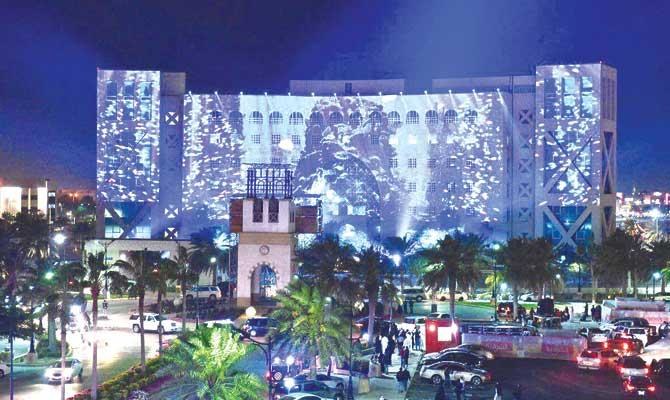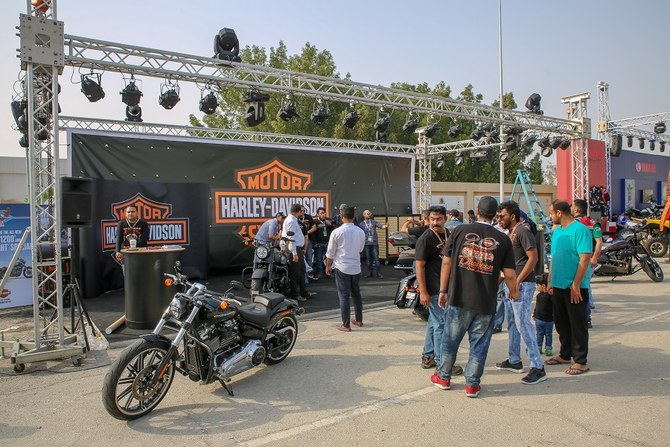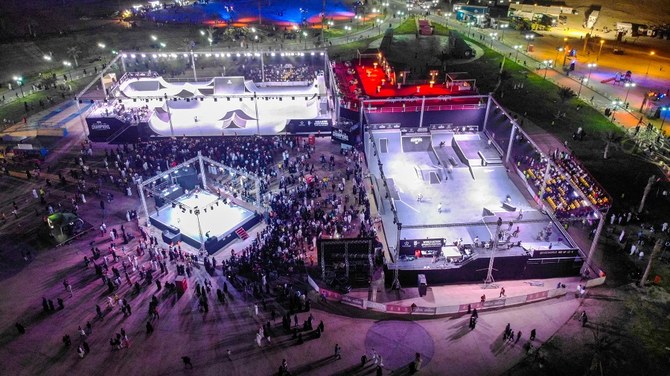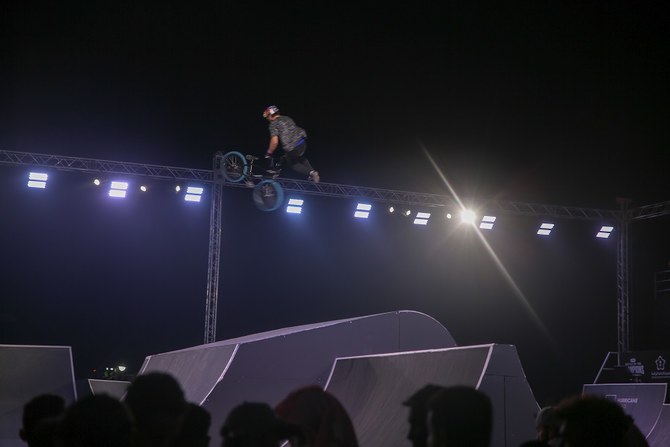AL-AHSA: The second day of Sharqiah Season got off with a vroom as hundreds of motorcyclists descended on a Saudi city for a major bike show.
Thousands of festival-goers on Friday flocked to music, arts and sports events taking place throughout the Kingdom’s Eastern Province.
In Dammam, motorcycle fans from all over the region and beyond attended the Saudi Bike Show, which continues on Saturday in Life Park. Biking club members from Saudi Arabia, Oman, Bahrain, the UAE, Kuwait, Jordan and the Philippines joined families for a day of motorcycle-related events.
Among the visitors enjoying stunt performances, displays and trade stands was Mohammed Al-Amari, a 32-year-old Saudi, and his seven-year-old son, Majid, who was wearing full motorcycle gear including a child’s helmet.
Elsewhere, at the King Abdullah Adventure Park, in Al-Ahsa, large crowds gathered to watch “Battle of the Champions,” an event organized by the Festival International des Sports Extremes (FISE), which featured some of the world’s top skateboard, BMX, parkour and rollerblade athletes.
See more photos from Sharqiah Season’s opening weekend here
Spectators watched bikers and boarders perform gravity-defying stunts on ramps and jumps, and local BMX bikers also showcased their skills as they hopped and spun their cycles on a separate stage next to the main event.
A training space was also set up for younger visitors to try out a few tricks of their own, with children strapping on rollerblades in padded enclosure, under the eye of trained athletes.
Many families at the festival event picnicked in the park, and children were entertained taking part in carnival-style sports games organized by the General Sports Authority.
Mishaal Al-Qahtani, from Al-Ahsa, told Arab News: “I’m glad that the beauty of Al-Ahsa is being shared with the rest of Saudi Arabia at last. It’s about time the focus shifted from Riyadh and Jeddah. Saudi Arabia has so much more to share. Sharqiah deserves this time to shine.”
Amani Al-Omran had traveled from Alkhobar to witness the FISE event. “We used to be chastised for wasting our time with bikes and skateboards. Now this huge event is happening right in our home town. It’s amazing.” 
In Jubail, more than 29 internationally renowned artists took part in the Tawiyyah Arts Exhibition as part of Sharqiah Season. The display, staged at Al-Fanateer’s cultural center in Jubail’s industrial city, featured 41 works of art created including paintings, sculptures, photo imaging, Arabic calligraphy and batik.
Spectacular 3-D presentations told stories through moving images projected onto the SABIC building in the heart of the industrial city, and there were interactive water shows and visual displays for visitors to enjoy on Al-Fanateer beach. Not all the Sharqiah Season events went to plan, with fireworks on Alkhobar Corniche having to be postponed on Thursday night due high winds. But the cancelation failed to dampen the spirits of visitors. Meshari Daghistani said organizers were doing an “amazing” job.
Sharqiah Season is the first of 11 scheduled festivals planned in the Kingdom in 2019.
In a collaborative effort by the Saudi Commission for Tourism and National Heritage, the General Entertainment Authority, the General Culture Authority and the General Sports Authority, the project aims to deliver an extensive entertainment experience for both Saudi citizens and foreign tourists.
The festival will feature more than 80 events across all the major cities in Eastern Province, including Dammam, Dhahran, Alkhobar, Al-Ahsa and Jubail.
Future seasons will focus on different areas of Saudi Arabia, with varying entertainment options for each city. There will be festivals concentrating on parts of the year such as Ramadan, Eid Al-Fitr and Eid Al-Adha.
Sharqiah Season continues in the Eastern Province until March 30, with sports events such as the Red Bull Air Race and Formula 1 H20 boat race, and concerts in Dammam featuring US singer Akon, Canadian DJ Deadmau5, US rapper Pitbull and US-Moroccan rapper French Montana.
The Saudi Bike Show is on until Saturday from 1 p.m. to 11 p.m. and is open to all ages, while the FISE “Battle of the Champions” continues on Saturday from 5 p.m. to 11 p.m.




































